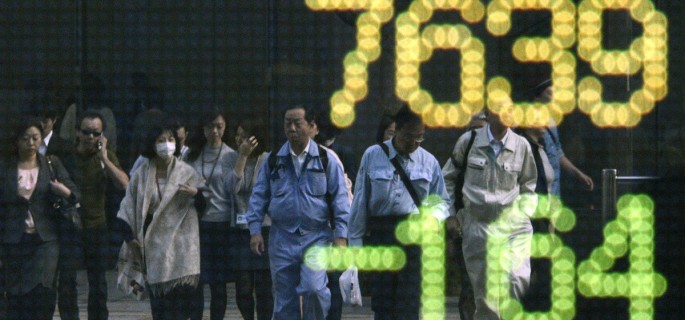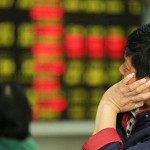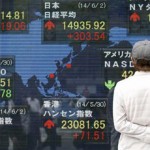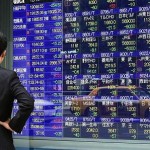Asian Stocks, Nasdaq Futures Slide on Apple; Aussie Sinks on CPI

-
European shares fluctuate amid mixed earnings; Total climbs
-
Apple, Twitter add to technology gloom as forecasts disappoint
Treasuries rose, sending 10-year yields lower for the first time in eight days, and the dollar weakened, as markets signaled caution before the Federal Reserve’s latest interest rate decision. Nasdaq 100 Index futures slumped as Apple Inc. tumbled after posting its first quarterly-revenue drop in more than a decade.
Benchmark 10-year note yields retreated from the highest level in a month. Asian shares fell with U.S. equity index futures as Apple’s earnings added to the gloom around the current reporting season for technology companies. Total SA advanced on a better-than-expected report, while Barclays Plc erased gains. Australia’s dollar weakened versus all 31 major peers. Crude oil rose above $45 a barrel for the first time since November.

Fed Funds futures reflect zero chance of an interest-rate hike on Wednesday, though the central bank’s comments will be scrutinized for any hints of a move in coming meetings.
“Whether they will still remain a little bit dovish, that is the key thing for us,” said Jens Peter Soerensen, chief analyst at Danske Bank A/S in Copenhagen. “Given that data has been not too strong but not too bad either, the risk is still very balanced. People are a bit reluctant to go in and buy the dollar until they see what the Fed does tonight.”
The Bank of Japan will review monetary policy on Thursday and Prime Minister Shinzo Abe’s economic adviser said Tuesday it’s possible that purchases of government bonds and exchange-traded funds will be stepped up.
The world’s three most valuable companies — Apple, Alphabet Inc. and Microsoft Corp. — have all released disappointing results in the past week, weighing on investor sentiment, even as most American firms’ profits prove more resilient than analysts anticipated. Three-quarters of Standard & Poor’s 500 Index members to have reported so far beat estimates in what was forecast to be the worst U.S. earnings season since the global financial crisis.
Bonds
Treasuries rose, snapping a seven-day losing streak that was the longest in almost three years. The 10-year yield fell three basis points to 1.90 percent at 12:04 p.m. in London.
Australia’s government bonds reversed losses after a surprise drop in consumer prices. The 10-year yield dropped four basis points to 2.62 percent, having been around 2.70 percent prior to the data.
Greek government bonds slid, pushing the yield on shorter-dated notes up by the most in more than three weeks, as Prime Minister Alexis Tsipras sought a meeting of euro-area leaders to resolve disagreements between the government and creditors, a move echoing last year’s drama when a quarrel over bailout terms almost pushed the country out of the currency bloc.
The yield on Greece’s July 2017 securities increased 119 basis points to 10.65 percent, the biggest jump since April 4. The equity benchmark ASE Index fell 3.9 percent, its largest decline in two months.
Stocks
The Stoxx Europe 600 Index added 0.1 percent, reversing losses of as much as 0.4 percent, amid mixed earnings results. Barclays slipped 0.6 percent. The lender had risen as much as 4.6 percent as revenue at the investment bank fell less than expected. Adidas AG jumped 8 percent to a record after raising its annual profit forecast as consumers spend more before this year’s 2016 UEFA European Championship.
Total SA added 1.7 percent after posting a smaller-than-projected drop in quarterly earnings, and Statoil ASA, Norway’s largest oil company, climbed 3.7 percent after reporting a surprise profit. Rio Tinto Group and BHP Billiton Ltd. dragged a gauge of miners lower as iron ore retreated. Societe BIC SA sank 6 percent after reporting a decline in margins.
Standard & Poor’s 500 Index futures slipped 0.2 percent, while contracts on the Nasdaq 100 slumped 1.1 percent. Apple fell 7.4 percent in premarket trading as waning demand for the iPhone weighed on its results. Twitter Inc. tumbled 15 percent after forecastingcurrent-quarter revenue that will fall short of analysts’ estimates. Facebook Inc. and PayPal Holdings Inc. are among companies reporting earnings after the close of markets Wednesday.
The MSCI Asia Pacific Index lost 0.7 percent. Apple supplier Murata Manufacturing Co. fell 4.4 percent in Tokyo, where Nomura Holdings Inc. posted a loss for the first time in more than four years after the close of trading. Canon Inc., the world’s biggest camera maker, tumbled by the most in three years after cutting its full-year operating profit forecast by 17 percent.
The MSCI Emerging Markets Index swung between gains and losses as declines in technology and consumer stocks offset gains in energy shares.
Apple suppliers led technology companies lower in Taiwan, with TPK Holding Co., a maker of touch screens, sliding 2.9 percent, and Catcher Technology Co., which manufactures metal housings for smartphones, falling 1.3 percent. Hon Hai Precision Industry Co., which makes iPhones, slipped 0.9 percent. AAC Technologies Holdings Inc. tumbled 2.5 percent in Hong Kong and LG Display Co. slid 3.9 percent in Seoul.
Currencies
The dollar weakened for a third day against the euro before the Fed announces its latest monetary policy decision.
The Fed “is seen on hold again,” UniCredit Bank AG strategists, including Vasileios Gkionakis, global head of currency strategy, wrote in a client note. The central bank “keeping a prudent approach” to its next policy moves “is unlikely to offer the dollar any help across the board,” according to the report.
The greenback depreciated 0.1 percent to $1.1306 per euro. It had declined 0.7 percent in the past two days.
Australia’s dollar slid 1.8 percent versus its U.S. counterpart after a report showed consumer prices fell 0.2 percent in the first quarter from the previous three months. The odds of an interest-rate cut at the central bank’s next policy meeting on May 3 surged to as much as 50 percent from 15 percent on Tuesday, according to a Credit Suisse Group AG index based on swaps.
“A pre-emptive May cut is surely now a real possibility,” said Gareth Berry, a foreign-exchange and rates strategist at Macquarie Bank Ltd. in Singapore. “At the latest, an August cut is now inevitable. That spells the end of this three-month-old Australian dollar rebound, and the downtrend can now resume in earnest.”
The New Zealand dollar fell for the first time in three days before the country’s central bank meets on Thursday. Markets are almost evenly divided over whether it will hold or lower its official cash rate following last month’s surprise cut to a record-low 2.25 percent.
The MSCI Emerging Markets Currency Index added 0.1 percent. South Korea’s won climbed for the first time in four days, adding 0.2 percent, as a gauge of consumer confidence improved in April.
The ringgit strengthened for the first time in five days, climbing 0.4 percent. The currency reversed losses after Malaysia named central bank Deputy Governor Muhammad Ibrahim to replace Governor Zeti Akhtar Aziz when she steps down at the end of the month after 16 years at the helm.
Dollar-denominated bonds of higher-rated companies in developing nations have been the most profitable and safest investments in 2016. While a 5.6 percent gain this year is not the biggest in absolute terms, it eclipses more than 130 assets from U.S. Treasuries to gold and even bitcoin when volatility is factored in, according to data compiled by Bloomberg.
Commodities
West Texas Intermediate crude rose as much as 2.5 percent to $45.13 a barrel, building on Tuesday’s 3.3 percent jump. U.S. inventories dropped by 1.07 million barrels last week, the industry-funded American Petroleum Institute was said to report, before the government releases stockpiles data on Wednesday. The World Bank also boosted its forecast for oil prices this year, projecting that refinery demand will pick up and U.S. output cuts will steepen in the second half of 2016.
Copper fell 0.6 percent to $4,931.50 a metric ton on the London Metal Exchange, retreating for a third day in the longest run in three weeks. Tin declined, while other industrial metals were little changed.
Silver rose 1.1 percent, trading near the highest in 11 months after entering a bull market last week. Output from mines will fall for the first time since 2011, while demand for the metal in uses including industrial products and jewelry is heading for a fourth straight gain, supporting prices, according to CPM Group.
Iron ore for September delivery fell 3.6 percent to 434.5 yuan or $66.92 a metric ton on the Dalian Commodity Exchange, declining for a fourth day as China’s commodity futures exchanges stepped up efforts to curb speculation in trading in everything from steel to iron ore and coking coal after a credit-fueled binge helped send prices soaring.
U.K. natural gas for next-month delivery extended gains after jumping Tuesday to the highest close since January on ICE Futures Europe. Chilly April weather – with actual temperatures more than 5 degrees Celsius below seasonal norms – boosted demand for fuel used for heating.
Source: Bloomberg





























